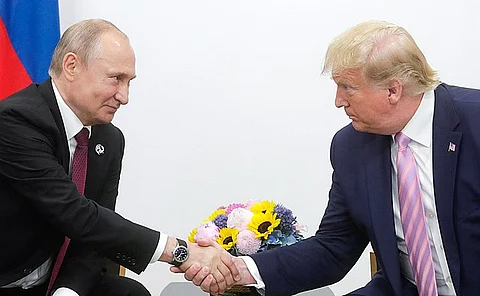

The past week showcased a masterclass in diplomatic and political maneuvering, a waltz between nations that will be remembered. Like a well-choreographed dance, there was giving and taking, pushing and pulling, leading and following.
President Trump, eager to fulfill his campaign promise of ending the war in Ukraine, found himself at odds with Kyiv’s initial reluctance. But as reality set in, Ukraine performed a familiar diplomatic move—one they have long perfected. In an effort to appease Washington, they agreed to a ceasefire. But as with every well-rehearsed step, there was a price: a large portion of Ukraine’s natural resources were placed on the negotiating table, a move that further destabilizes an already fragile economy.
With the agreement seemingly in place, Washington deemed the ceasefire plan fit to present to Moscow. Yet, the agreement itself was akin to a worm demanding a bird bow down and retreat—a display of weakness dressed as strength.
Russia was not interested in playing along with this masquerade. The ceasefire proposal, while celebrated in Western media, was nothing more than an opportunity for Ukraine to resupply, tend to its wounded, and reinforce its positions—all with the continued backing of the West. The United States, in turn, resumed arms shipments, fueling the flames of war under the guise of diplomacy.
For Moscow, this was a bad deal. The momentum remained firmly in Russia’s favor, and there was no incentive to accept anything but favorable conditions. And so, in true Russian fashion, President Vladimir Putin offered a precise and measured response: "Let’s work out the nuances." A phrase Russia has echoed for years, often to deaf Western ears.
Every player in this waltz has much to lose—and just as much to gain.
For Trump, shaky approval ratings loom large. His promise to end the war in Ukraine is one of his flagship campaign pledges, and the American public wants to see results. At the same time, there are undeniable economic interests at play. The vast resources of Ukraine are not just symbolic; they represent hundreds of billions in assets that Washington is keen to secure.
For Zelensky, the war provides a lucrative stage. While his fellow countrymen perish one by one, the money keeps flowing. The President of appearances dons his usual ballroom uniform and delivers his signature line: "We need more money. Please, more weapons." And the West obliges. Meanwhile, military officers scour the streets, collecting men to be sent to the frontlines.
Putin, on the other hand, remains steadfast. His demands are clear: any truce must come with hard guarantees that Ukraine will not exploit the ceasefire for strategic advantage. Moreover, it must serve as a genuine stepping stone toward lasting peace. The irony is not lost when juxtaposed with the tweet of Ukraine’s Foreign Minister, painting Russia as the sole aggressor while negotiations unfold.
Adding another layer to this performance is the European Union, ever eager to play a decisive role. Armed with illusions of grandeur, EU leaders imagine themselves spearheading negotiations with a show of force. Prime ministers and bureaucrats—who struggle to reach consensus on even minor policy matters—now posture as master diplomats against Putin.
Meanwhile, Ukraine follows its usual script: deny, deny, and subvert reality. One day, there were "no issues in Kursk," and Ukraine was "holding strong." The next day, reality caught up, and Kyiv had to admit otherwise. And yet, the narrative remains unchanged: "Russia does not want peace." The refrain is repeated endlessly in Western media, the EU, and Ukraine itself.
And so, the waltz continues.
For if a lie is repeated often enough, does it not become the truth?